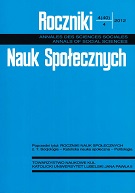Korupcja jako metafora
Corruption as a metaphor
Author(s): Dirk TänzlerSubject(s): Social Sciences
Published by: Towarzystwo Naukowe KUL & Katolicki Uniwersytet Lubelski Jana Pawła II
Keywords: corruption; Romania; Germany; administration; reforms; korupcja; Rumunia; Niemcy; administracja; reformy
Summary/Abstract: The author of the article attempts to depict corruption as evaluation of social activity, and not as a structural relationship. His objective – as well as of the analysis of “corruption cultures” contained in the text – is not only to seek genetic reasons of the omnipresent phenomenon of “corruption”, which is explained normatively, but search in the social sense of corruptive practice in a specific historical situation. In the author’s opinion, research into corruption in Romania as an allegedly clearcasewill allow broader understanding of this phenomenon, e.g. also in Germany. Thus, if “traditional network relations” in Romania between political and economic elites block functional differentiation by applying liberal rhetoric to legitimisation, the liberal (administrative) reforms in Germany result in reversal of the differentiation and reduced reasonability of activity, which provides new fuel to development of networks and corruption instead of reducing them as originally intended. Therefore, corruption is an effect of structural conflict of objectives between activity of the administration and activity of entrepreneurs in the conditions of private economy, which creates the problem concerning the role and identity of state officials.
Journal: Roczniki Nauk Społecznych
- Issue Year: 40/2012
- Issue No: 4
- Page Range: 69-87
- Page Count: 19
- Language: Polish

